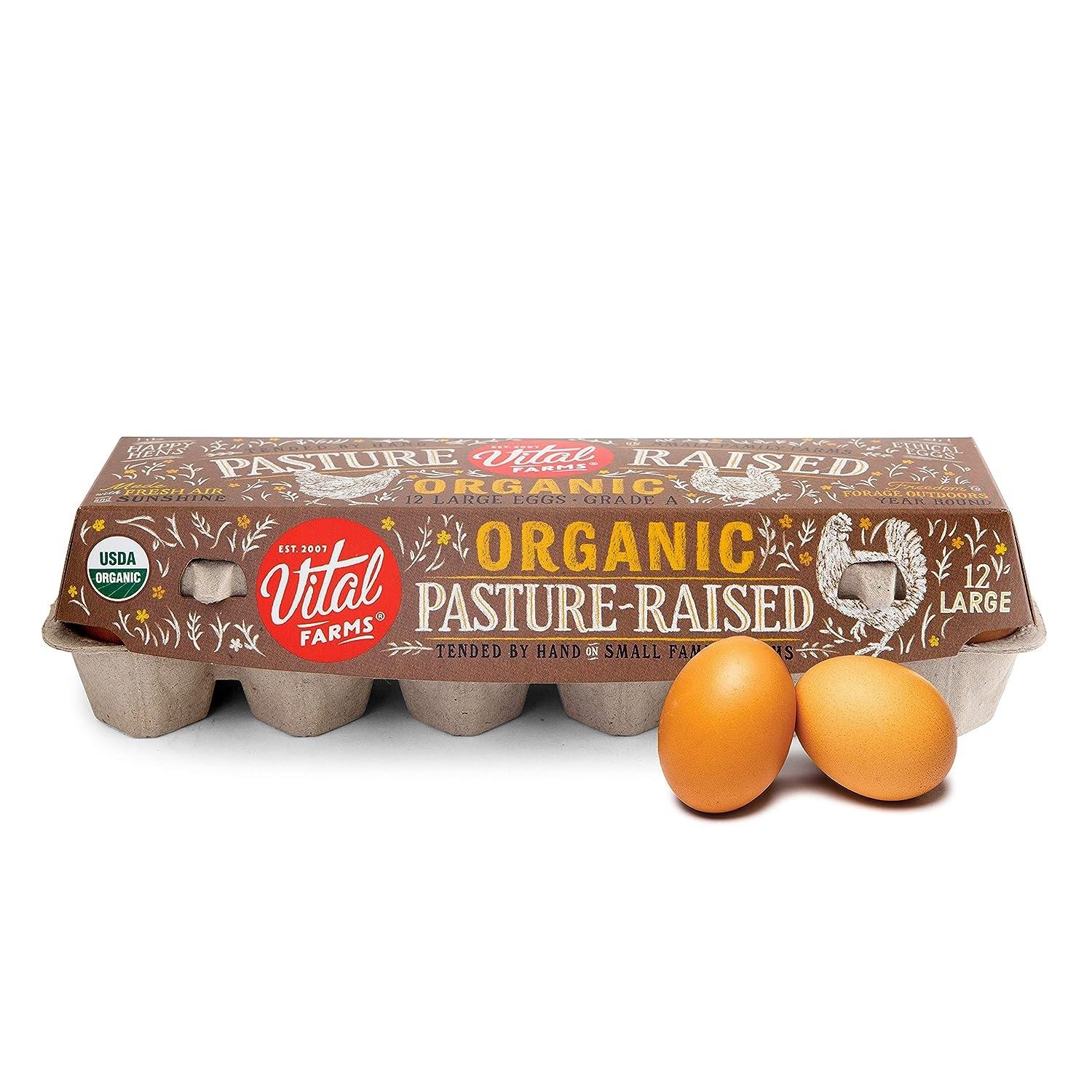
When it comes to choosing the best quality eggs for our meals, pasture-raised eggs have gained popularity for their superior nutritional value. These eggs are not only delicious but also provide a plethora of health benefits that surpass those of conventional eggs.
Unlike conventionally-raised eggs, which come from chickens raised in cramped cages or factory farms, pasture-raised eggs come from chickens that freely roam in open pastures. This means that these chickens have access to fresh air, sunlight, and a natural diet consisting of insects, seeds, and grass. As a result, the eggs they lay are packed with more nutrients and have a richer taste.
In this article, we will delve into the nutrition facts of pasture-raised eggs. From their rich protein content to their abundance of vitamins and minerals, we will explore why these eggs are not just a tasty addition to our meals but also a healthy choice for our well-being.
Key Takeaways:
- 1. Pasture-raised eggs are a superfood, packed with protein, vitamins, and healthy fats. They support muscle growth, eye health, and a strong immune system. Plus, they taste egg-ceptional!
- 2. Choosing pasture-raised eggs is good for you and the planet. They have higher levels of essential nutrients, lower environmental impact, and support ethical animal welfare. It’s eggs-traordinary!
High in Protein
Pasture-raised eggs are a fantastic source of protein, with an average of 6 grams per egg. Protein is essential for building and repairing tissues, supporting muscle growth, and boosting metabolism.
Rich in Vitamins
These eggs are packed with essential vitamins, including vitamin A, vitamin B12, vitamin D, and vitamin E. These vitamins play a crucial role in maintaining healthy skin, promoting strong bones, and supporting a robust immune system.
Omega-3 Fatty Acids
Pasture-raised eggs are known to have higher levels of omega-3 fatty acids compared to eggs from conventionally-raised hens. Omega-3s are beneficial for heart health, reducing inflammation, and supporting brain function.
Lower in Cholesterol
Contrary to popular belief, studies have shown that pasture-raised eggs may have lower cholesterol levels and higher levels of heart-healthy nutrients compared to conventional eggs.
Lutein and Zeaxanthin
Pasture-raised eggs contain higher amounts of lutein and zeaxanthin, antioxidants that are essential for maintaining healthy eyes and reducing the risk of age-related macular degeneration.
Improved Omega-6 to Omega-3 Ratio
Unlike conventionally-raised eggs, pasture-raised eggs have a more favorable omega-6 to omega-3 fatty acid ratio. This balance is important for maintaining overall health and reducing the risk of chronic diseases.
Rich in Choline
Choline is an essential nutrient that plays a vital role in brain development, liver function, and muscle movement. Pasture-raised eggs are a natural source of choline, providing about 150 mg per egg.
Antibiotic-Free
Pasture-raised eggs come from hens that are not treated with antibiotics. This ensures that the eggs are free from any antibiotic residues, making them a healthier choice.
Higher Levels of Vitamin B12
Pasture-raised eggs have been found to contain higher levels of vitamin B12 compared to eggs from conventionally-raised hens. Vitamin B12 is essential for energy production, red blood cell formation, and nerve function.
Improved Animal Welfare
Choosing pasture-raised eggs supports better animal welfare practices. These eggs come from hens that have access to outdoor areas where they can roam, forage, and exhibit natural behaviors.
Reduced Environmental Impact
Pasture-raised egg production methods often involve sustainable farming practices that minimize the environmental impact. This includes rotational grazing, organic feed, and reduced use of chemical inputs.
Higher Vitamin D Content
Pasture-raised eggs contain higher levels of vitamin D compared to conventional eggs. Vitamin D is important for calcium absorption, bone health, and immune system function.
Lower Risk of Contaminants
Studies have shown that pasture-raised eggs have a lower risk of contamination with bacteria such as Salmonella. This is attributed to the healthier living conditions and natural foraging behaviors of the hens.
Enhanced Flavor and Texture
Pasture-raised eggs are often praised for their superior taste and texture compared to conventional eggs. The natural diet and outdoor activities of the hens contribute to the rich flavor and creamy texture.
Increased Levels of Vitamin E
Vitamin E is an important antioxidant that protects cells from damage. Pasture-raised eggs have been found to contain higher levels of vitamin E compared to conventional eggs.
Improved Nutrient Absorption
The combination of a nutrient-rich diet and higher levels of beneficial compounds in pasture-raised eggs may enhance the absorption of essential nutrients in the body.
Lowered Risk of Heart Disease
The favorable nutritional profile of pasture-raised eggs, including higher omega-3 fatty acids and lower cholesterol levels, may contribute to a reduced risk of heart disease.
Boosted Immune System
The vitamin and mineral content in pasture-raised eggs, along with their natural anti-inflammatory properties, can help support a strong and resilient immune system.
Sustainable Farming Practices
Choosing pasture-raised eggs supports sustainable agriculture by encouraging responsible land management, preserving biodiversity, and promoting ethical animal husbandry.
Conclusion
Pasture-raised eggs offer a wide range of nutrition benefits that make them an excellent choice for your diet. With higher levels of omega-3 fatty acids, vitamins, and minerals compared to conventional eggs, pasture-raised eggs can contribute to improved cardiovascular health, enhance brain function, and support overall well-being.
By ensuring that the hens have access to natural pasture and a varied diet, pasture-raised eggs contain higher levels of beneficial nutrients that can’t be found in eggs from caged or cage-free hens. They have a richer flavor and a higher quality yolk, making them a perfect addition to your favorite recipes.
Adding pasture-raised eggs to your daily diet provides not only superior nutrition but also supports ethical and sustainable farming practices. Choose pasture-raised eggs for a healthier and more flavorful option that nourishes your body and benefits the environment.
FAQs
1. What does “pasture-raised” mean?
Pasture-raised refers to a farming system where hens have access to the outdoors and are given plenty of space to roam and forage for natural vegetation and insects.
2. How are pasture-raised eggs different from conventional eggs?
Pasture-raised eggs come from hens that have a more diverse and natural diet, leading to higher levels of vitamins, minerals, and omega-3 fatty acids compared to conventional eggs.
3. Are pasture-raised eggs more nutritious?
Yes, pasture-raised eggs have been found to contain higher levels of important nutrients such as vitamins A, E, and D, as well as omega-3 fatty acids, which can help reduce inflammation and improve heart health.
4. Are pasture-raised eggs worth the extra cost?
Absolutely! While they may be slightly more expensive than conventional eggs, the superior nutrition and better taste make pasture-raised eggs well worth the investment in your health and enjoyment of your meals.
5. Can I use pasture-raised eggs in any recipe?
Yes, pasture-raised eggs are versatile and can be used in any recipe that calls for eggs. They are especially great for baking, as the higher fat content in the yolks can result in moister and more flavorful baked goods.
Was this page helpful?
Our commitment to delivering trustworthy and engaging content is at the heart of what we do. Each fact on our site is contributed by real users like you, bringing a wealth of diverse insights and information. To ensure the highest standards of accuracy and reliability, our dedicated editors meticulously review each submission. This process guarantees that the facts we share are not only fascinating but also credible. Trust in our commitment to quality and authenticity as you explore and learn with us.


